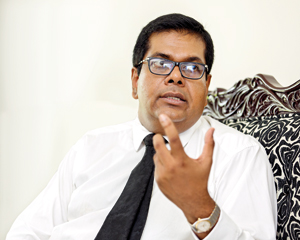Sri Lanka to implement tough legislation against corruption in sports
View(s):
Panduka Keerthinanda, the Legal Adviser of the Ministry of Sports, is back in the saddle
The process was accelerated against the backdrop of match-fixing and corruption allegations which caused the International Cricket Committee (ICC) investigators to start inquiries. The probe is ongoing. A few have been charged and one has been banned. The new law to be passed in Parliament will make it legally possible to try them in court, a major breakthrough in the fight against corruption.
The Bill on Prevention of Offences Relating to Sports has been gazetted after months of deliberation by the Sports Ministry, Attorney General’s Department and the Legal Draftsman. It now awaits passage in Parliament to make all sports-related corruption, particularly match-fixing and illegal and betting, criminal offences.
The gazette was issued on August 23, 2019. The law carries jail terms and hefty fines to deter potential criminals.
Once passed, Sri Lanka will be the first Asian country–following in the footsteps of South Africa, England, Australia and New Zealand–to introduce such a law. It covers every aspect of corruption including engaging in betting, gambling, match-fixing, providing inside information for benefits, financial or otherwise, and any action that brings the sport into disrepute. It gives power to charge suspects under Sri Lanka’s judicial system.
“As there were no laws in Sri Lanka, we could not try anyone before the rule of law, said Panduka Keerthinanda, Sports Ministry Legal Adviser. ;-
“By implementing this, we hope to deter would-be corruptors from engaging in such activities.”
“There’s provision to charge anyone who corrupts the sport,” he continued.
“There’s a misconception that this law will prevent the operations of the legal betting and gaming business in the country. We are not going to do that. But the law will deal with illegal betting and related corruption, like bribery.”
Keerthinanda, a lawyer, was instrumental in drafting the new bill, along with officials representing the Attorney General’s Department. He called it a major victory in Sri Lanka’s fight against cancerous match-fixing and corruption in sports.
The ICC is currently carrying out a major investigation into match-fixing in Sri Lanka, a country it believes is one of the worst offenders. They have charged several players but are yet to conclude the probe. The National Audit Office has also questioned Sri Lanka Cricket on alleged misappropriation of funds such as in the instance of a questionable deal to build the Sooriyawewa Cricket Stadium and the awarding of television rights.
“If a bookmaker approaches a cricketer or an administrator and attempts to fix the outcome of the match, to fix specifics moments in a match (spot fixing), or change the conditions of the pitch, it’s an offence under the new law,” Keerthinanda said.
The new law has strong sanctions for those found guilty. These include a jail term of up to 10 years, a fine not exceeding Rs 100mn, or both fine and imprisonment for the offence of match-fixing (covering spot fixing and pitch fixing), offence of corruption in sports, offence of unlawful betting and aiding, abetting and conspiring in the commission of any offence.
“Punitive reasons apart, there are exemplary reasons too,” he said. “Young players cannot be allowed to begin their careers believing that they can ‘get away’ by doing anything. This is the main reason why match-fixing laws are important.”
The draft law makes concealing information a criminal offence which carries a penalty of up to two years in jail or a fine of Rs. 200,000 or both. Failure to cooperate in relation to any corruption-related investigation has also been made a criminal offence and those found guilty will receive up to one year in jail or a fine not exceeding Rs. 100,000 or both.
A failure to maintain confidentiality by a service provider and making false allegations against anyone are offences which entail a fine, a jail term or both.
Inquiries will be carried out by a Sports Investigation Unit (SIU) to be set up by the Minister of Sports, consisting of senior police officers above the rank of Assistant Superintendent of Police (ASP) who will probe and initiate legal action. The suspects will be charged before the High Court of Sri Lanka. There are also provisions relating to extradition arrangements.
After a preliminary inquiry conducted by the Director General of Sports upon receipt of any information, the SIU (appointed by the Minister of Sports in consultation with the Minister in charge of Law and Order) will investigate, before referring it to law enforcement authorities for prosecution.


